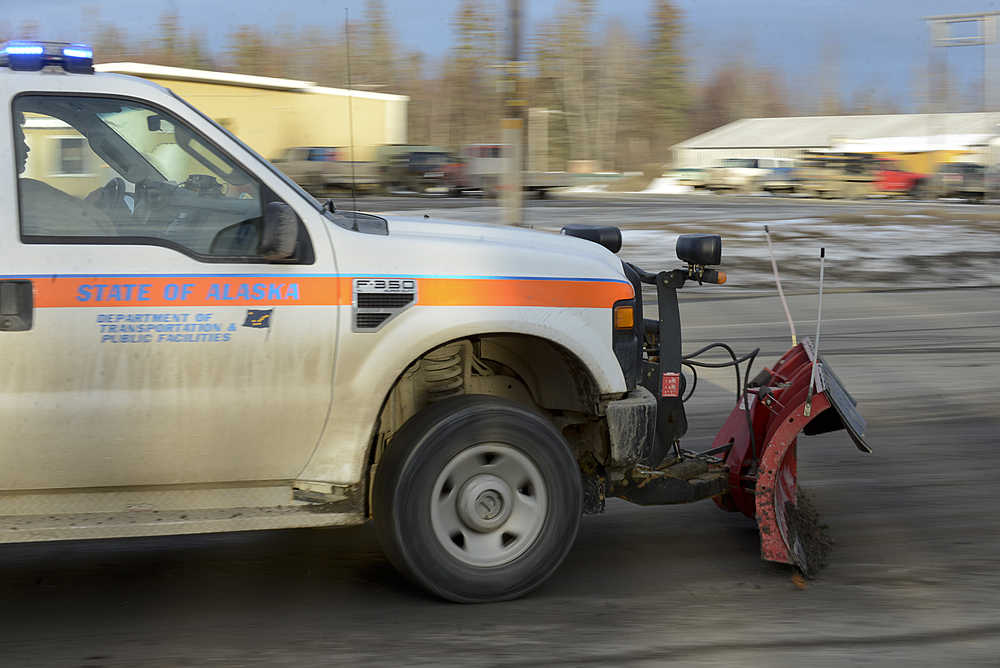Several hundred gallons of drilling waste bound for the newly opened AIMM Technologies monofill site in Nikiski, splashed out of a truck, onto the Kenai Spur Highway and the parking lot of Charlie’s Pizza whose owner, Steve Chamberlain, fought hard to keep the state from granting a permit for the site.
As reports of the slick mud coating the highway filtered through the community, several agencies and companies responded, including the Alaska Department of Transportation, the Department of Environmental Conservation, AIMM, and finally cleanup crews who spent the evening shovelling mud from roadside ditches, vacuuming up the waste and washing the highway.
While the circumstances surrounding the incident are not entirely clear, it is believed to have happened between midnight and 7:40 a.m. on Tuesday when employees of Charlie’s Pizza reported to work. A DEC representative said the driver of a Chumley’s truck was delivering waste from a Cook Inlet Energy drilling site and likely hit the brakes hard enough to cause the muddy discharge to splash all over the road.
“They didn’t even know it happened,” said DEC Environmental Program Specialist Don Fritz.
The only site Cook Inlet Energy owns on the east side of Cook Inlet is the North Fork Unit and gas field located on the southern Kenai Peninsula, east of Anchor Point, which is about 80 miles from Nikiski.
The slick drilling waste mixed with melting snow and mud on the road and spread for several hundred feet on the Kenai Spur Highway and into the Charlie’s Pizza parking lot before DOT personnel restricted traffic to one lane Tuesday afternoon and began cleanup.
DOT station manager Brian Gabriel used a snow plow on a DOT pickup truck to scrape the bulk of the mud out of the road and onto the shoulder before Emerald Alaska Inc. spill cleanup services crews arrived with a pump truck, a pressure washer and several workers to clean up the road.
Chamberlain and AIMM representative Scott Anderson spent several minutes going over how the company would respond to the incident — though AIMM left the cleanup to the company responsible for the mess. When cleanup crews arrived, Anderson and Fritz told them that Chamberlain’s parking lot would also need to be cleaned and suggested that the gravel should be taken out of the front part of the parking lot to mitigate the spread of the waste.
Fritz said the waste was “pretty benign” and that Cook Inlet Energy had offered to turn over data safety sheets on all of the compounds contained in the mud.
“This is from a gas well, they’re not drilling for oil. So there’s no oil involved here,” Fritz said.
Chamberlain, who spent most of his time inside of the restaurant serving pizza to a lunchtime rush of customers, said he was angry about the whole incident.
“These issues were brought up before and my concern is that they’re just getting started putting stuff in there and right away, the first load to go in there causes an issue,” he said. “We nailed it, basically — the people who were speaking against (the monofill site) and saying this was going to happen.”
Chamberlain said customers had been driving through the mud all day and had tracked it into his parking lot and restaurant and he was worried that the substance would end up in his well, which is located near the entrance of the lot.
He also took issue with several chunks of wood and debris that he said fell from the truck transporting the waste.
“That’s not supposed to be in there, you’re violating your permit,” he said to Anderson as the two stood in front of the pizzeria. “If those things go into the pit and get covered in thousands of pounds of waste — they’ll pierce right through your liner.”
Chamblerlain later said he hoped that someone learned a lesson from the whole incident.
“I feel (my property) is now contaminated and they need to clean it all up, every drop, and get clean gravel. Scrape it up … move on and be more responsible,” he said. “It’s a learning process for them. … They fix the problem, at no expense to me, clean it up as best as they possibly can and learn from it because it’s going to be cheaper this way. If they do it right, in the future it’ll be cheaper in the end.”
As the sun set over the nearby Cook Inlet, Gabriel and several other members of DOT continued to reroute traffic and worked with Emerald crews to scrape the road clean.
“They’ll sweep up as they can and hopefully as they pressure wash it, it’ll take some of that slickness off the surface. But, we’ll follow up with some sand,” Gabriel said.
Rashah McChesney can be reached at rashah.mcchesney@peninsulaclarion.com.

